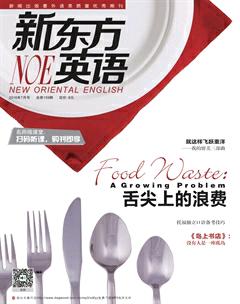外祖母的食譜:愛的味道
By+David+Ferguson
如今,隨著生活節奏加快,經濟條件變好,我們在外就餐的時候越來越多。每當我們走進一家餐館,心里都或多或少地期待能品嘗到符合自己口味和心意的美食,但結果卻很可能令人失望。直到有一天,當我們回到家中,夾起外婆做的簡單可口的飯菜,我們才終于意識到:無論哪里的珍饈佳肴,都不如外婆做的那一碗愛的味道。
Times are a little tough at our house right now. Neither one of us makes a lot of money, but years of experience have taught us how to walk between the raindrops and make it from one month to the next with a fair amount of grace.
I cook a lot at home, more when were facing lean times. When I know that I have to keep us fed on not much money, I fall back on my grandmothers recipes.
She taught me to cook. When I was a kid, my twin brother and I spent long summer weeks and Christmas vacations with my mothers parents, a rural mail-carrier and a textile mill worker in the mountains of north-west North Carolina.
I didnt care much for quail1) hunting or fishing for bass2) and rainbow trout3) like my brother and grandfather. Guns were loud and terrifying, fields were gross and full of mud. Also, little David just wasnt great at killing things. I shuddered when pushing worms on to fishhooks, cried quietly when stuffing bloody limp birds into the game sack.
Turned out, though, that I was really good at baking cakes. So rather than go shiver on frozen mornings in a deer blind4) praying I wouldnt have to pull the trigger on this shotgun, I found myself more and more in the kitchen with my grandmother, watching her soft, arthritis5)-bent hands drizzling corn starch6) into the filling for a lemon chess pie.
“The more you pay, the worse you eat,” she would say. Grandmother had a near-total disdain for restaurants, particularly expensive ones. I told her once that Id been to a “soul food7)” restaurant in New York City where they charged six dollars for a serving of collard greens8) and she was aghast.
“Somebody needs to tell those people that they can pick their own collards for free on the side of the road!” she said, disgusted. And its true. Collards are a weed, but theyre a weed thats packed with iron, calcium and other nutrients, so my dirt-poor ancestors learned how to cook them and make them taste delicious.
My great-grandmother died when my grandmother—the oldest of nine—was 11 years old. As the eldest daughter, she was expected to take on all of the child-rearing duties, grocery shopping (such as it was in the 1930s), cleaning and cooking. She did all of this while attending school and then working full time. I have her high school graduation certificate, which she signed in perfect rounded copperplate9) script on 6 June 1936.
Throughout the Great Depression and the privations10) of the Second World War, she learned how to make a little food go a long way. Vegetables were cheap, so she cooked a lot of them, mostly only using small amounts of meat for seasoning. Roast beef was a twice-a-month luxury, but there was nothing she couldnt do with a chicken, every part of it. Nothing went to waste.
I remember once when I was little, I went to scrape11) some leftover food off my plate and into the trash and she stopped my hand.
“We dont never, ever throw food away in this house,” she said, pointing at the pot of scraps kept each day for my grandfathers two bird dogs, Dixie and Sport. “Never, ever. If youre not going to eat it, give it to the dogs.”
Now I understand that for her food was sacred. The love she felt for us was just as much an ingredient as the flour, salt and pepper breading her fried chicken or the candied pecans12) on top of her baked sweet potatoes. Once food had passed through her hands, it was sanctified by love.
I feel connected to my grandmother and to her mother and to hundreds of years of family and regional history when Im in my kitchen making country food. In the delicious smells and the intoxicating13) blends of flavors on flavors is a long tale of victory over hard times, of conquering starvation—of not just surviving, but flourishing and finding joy and pleasure in every meal of every day.
A big pot of pinto beans14) are, as Steinbeck15) said, “a roof over your stomach. Beans are a warm cloak against economic cold.” Add rice and a steaming hunk16) of buttermilk cornbread and its a nourishing, satisfying meal. Add slices of home-grown tomato and its heaven on a plate. Total cost to feed four people: under $10.
From my mother and grandmother I learned to take real satisfaction in feeding people. My grandmother would beam with pleasure over a heavily laden table and say: “Do you know what this would cost at the cafe?”
I never knew what cafe in particular she had in mind, but I knew that the question was totally not fair, because no restaurant anywhere can cook like a grandmother.
But now, thanks to her guidance and years of practice, I can.
1. quail [kwe?l] n. 鵪鶉
2. bass [b?s] n. 鱸魚
3. rainbow trout:虹鱒魚
4. blind [bla?nd] n.〈美〉(狩獵時的)埋伏處
5. arthritis [ɑ?(r)?θra?t?s] n. 關節炎
6. starch [stɑ?(r)t?] n. 淀粉
7. soul food:靈魂料理,美國黑人的傳統菜肴,以煎炸為主。
8. collard greens:羽衣甘藍
9. copperplate [?k?p?(r)?ple?t] n. 工整的圓形西文手寫體
10. privation [pra??ve??(?)n] n. 匱乏;貧困
11. scrape [skre?p] vt. 刮掉
12. pecan [?pi?k?n] n. 美洲山核桃
13. intoxicating [?n?t?ks??ke?t??] adj. 令人陶醉的
14. pinto bean:產于美國西南部用作食品或飼料的菜豆
15. Steinbeck:即約翰·斯坦貝克(John Steinbeck, 1902~1968),美國小說家,代表作為《憤怒的葡萄》(The Grapes of Wrath)。
16. hunk [h??k] n. 大塊,大片
我們家這陣子日子有點難過。我倆賺的錢都不多,但多年的生活經驗教會了我們如何熬過困難時期,比較體面地過日子。
我經常在家做飯,日子一緊巴,做得就更多了。我知道全家就指望不多的那點錢填飽肚子,于是外祖母的食譜在我這兒又派上了用場。
是外祖母教會了我做飯。小時候,每到悠長的夏日或是圣誕節假期,我和我的雙胞胎兄弟都會去外祖父母家。他們住在北卡羅來納州西北部的山區,外祖父是鄉村郵遞員,外祖母是紡織廠工人。
我不像我兄弟和外祖父那樣喜歡打鵪鶉或是釣鱸魚、虹鱒魚。槍聲太響,又嚇人,地里全是泥,感覺很惡心。而且,我小時候就不是那種擅長宰殺動物的人。那會兒,往魚鉤上穿蟲子都能讓我打哆嗦,當我把鮮血淋漓、軟不拉幾的鳥塞進獵物袋時,我會默默地哭泣。
不過,我后來發現自己特別擅長烘焙。所以,冰冷的清晨我不再待在獵鹿的埋伏處一邊凍得瑟瑟發抖,一邊祈禱著不要讓我扣獵槍的扳機。我發現自己和外祖母待在廚房的次數越來越多,看著她因患關節炎而有點彎曲的手輕柔地將玉米淀粉撒到做檸檬切斯派的餡中。
外祖母會說:“花錢越多,吃得越差。” 對于餐館,尤其是那種價格昂貴的餐館,外祖母的態度幾乎是完全的不屑。曾經有一次,我跟她說我去過紐約的一家“靈魂料理”餐廳,那里的一份羽衣甘藍就要六美元。她聽了目瞪口呆。
“得有人告訴那些人,他們不花錢就能在路邊摘到羽衣甘藍!”她憤憤不平地說道。她說的沒錯。羽衣甘藍就是一種草,但是這種草富含鐵、鈣以及其他多種營養物質,所以我那些窮得叮當響的祖輩們才學會了怎么烹飪羽衣甘藍,而且還做得很美味。
我曾外祖母去世時,外祖母只有11歲。作為家中九個孩子里的老大,外祖母理所當然就要承擔照顧弟弟妹妹的全部職責,還要負責買食品雜貨(而且還是在20世紀30年代的大蕭條時期)、打掃衛生和做飯。她一邊做著這些事情,一邊上學。后來又一邊做全職工作,一邊照顧家里。我還保存有她高中的畢業證書,上面有她的簽名,是工整的圓形手寫體,日期是1936年6月6日。
大蕭條以及二戰期間物資匱乏的時候,外祖母學會了怎樣讓少量的食物夠吃很長時間。蔬菜便宜,她便多做蔬菜,通常只用一點點肉來提味。烤牛肉是奢侈品,一個月才能吃兩頓。但外祖母能用雞做出各種美味,雞身上所有的部位都能用上,通通不會浪費。
我還記得小時候有一次我要把盤子里沒吃完的食物扒拉進垃圾桶,外祖母阻止了我。
“在咱們家,絕對不能把食物丟掉,”她邊說邊指著外祖父的兩條獵鳥犬迪克西和斯波特的食盆,“絕對不能丟掉。你要是不打算吃了,可以給狗吃。”
現在我才明白,對外祖母來說,食物是神圣的。她對我們的愛就像撒在炸雞上的面粉、鹽和胡椒,或是她撒在烤紅薯上的糖霜山核桃一樣,是一種原料。食物一經她的手,便被愛神圣化了。
每當我在廚房準備家鄉風味的食物時,我就會感覺自己跟外祖母、曾外祖母,跟數百年來家族和當地的歷史聯系在了一起。各種美妙的香味和各種令人陶醉的味道搭配在一起,其中蘊含著一部長長的勝利史,一部戰勝困難時期、戰勝饑餓的歷史——不僅要活下來,還要把日子過得蒸蒸日上,要在每天的每頓飯中找到幸福和快樂。
正像斯坦貝克說的那樣,一大鍋菜豆就“能為你的胃遮風擋雨。豆子是抵御經濟嚴寒的溫暖斗篷”。加上米飯和一大塊熱氣騰騰的酪乳玉米面包,這就是一頓營養豐富的美味佳肴。再配上幾片自家種的西紅柿,這就是一頓瑤池盛宴。這樣一頓飯能喂飽四口人,總共花費不到十美元。
從媽媽和外祖母那兒,我學會了怎樣從做飯中得到真正的滿足。外祖母會眉開眼笑地望著一大桌豐盛的美食說:“你們可知道,這一桌要是在飯店得花多少錢嗎?”
我從來不知道她說的具體是怎樣的飯店,但是我知道這么問一點兒也不公平,因為無論什么地方的飯店都做不出外祖母做的味道。
但是現在,多虧外祖母的

